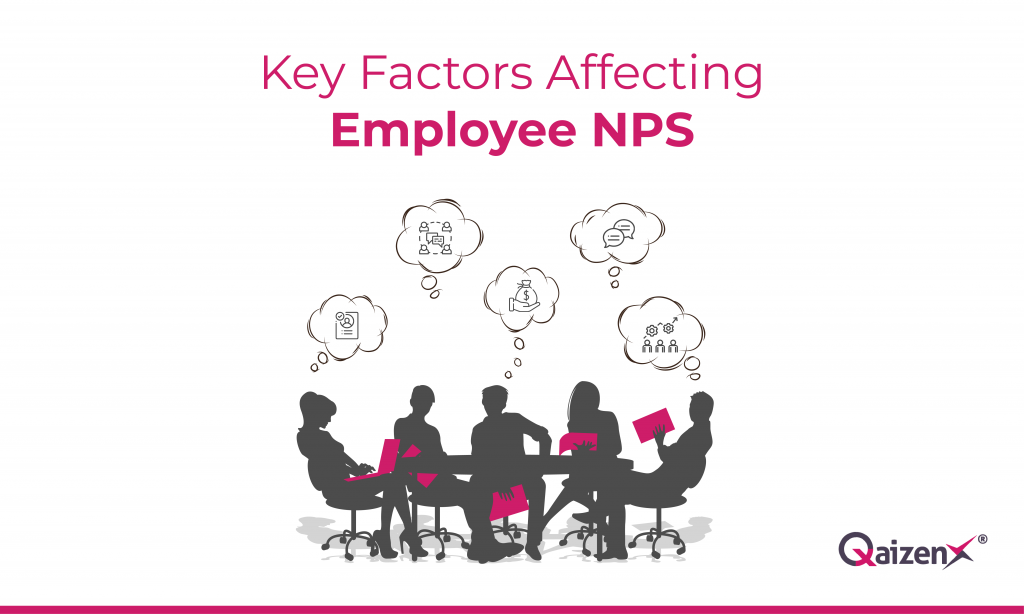11 Key Factors Affecting Employee NPS

Employee Net Promoter Score or Employee NPS (eNPS) is a simple metric that measures how your employees feel about your organization and how likely they are willing to share positive reviews about the organization.
It’s important to know that your company’s employee Net Promoter Score (i.e., the number of employees who would recommend the company) has a significant impact on the success of an organization. The question remains, however, what factors can affect the score and how to use that information. The following considerations are some of the most important ones.
What makes a good employee NPS?
An employee’s NPS is influenced by several organizational and individual factors. As you work to improve your employee experience and build customer loyalty, you need to measure how employees feel about everything from managers and peers to benefits and policies. Also, a high employee NPS allows you to maximize your bottom line while ensuring that your employees have a positive work experience. To get there, you must know what makes an employee feel satisfied in their job — and what can make them unhappy.
Overall job satisfaction:
The main driver of high eNPS is overall job satisfaction. If employees are happy in their roles and understand how their work contributes to the organization’s success, they’re likely to recommend their company as a great place to work. (Conversely, it makes sense that unhappy employees will be unlikely to recommend the company, thus affecting the scores.)
Management:
Managers drive satisfaction for their teams and are a significant driver of eNPS. When managers show care and concern for their employees, they create an environment that inspires loyalty — and that makes employees more likely to provide positive reviews. At the same time, when management shows consideration for employee concerns, the team is more likely to feel emotionally connected to the organization as a whole.
What does the eNPS calculator show?
The calculator used to calculate the employee NPS score is an online tool that calculates employee scores between 0-100 (0 meaning worst score possible and 100 meaning best possible score). This calculator can measure company, employee, and the overall score.
Many things will affect your eNPS. We have narrowed them down to 11 important points.
1. TRAINING AND DEVELOPMENT:

Employees who feel that they have been well trained and developed will have a higher eNPS. Employees will appreciate how their company is invested in them, and those who feel like they are getting the most out of their job will have higher eNPS.
2. MANAGEMENT:
Employees who feel supported by upper management will also have a higher eNPS. So, Make sure that the management is open to listening to employees and understanding the issues they face.
3. DIVERSITY AND INCLUSION:
The culture of the organization will also affect your employee NPS. Employees will be more likely to recommend a company that shares similar values and culture. A positive, healthy culture is one where employees are happy to work and give positive reviews, especially to potential employees.
4. HUMAN RESOURCE MANAGEMENT:
How much the company invests in their employees will also affect your employee NPS. Employee benefits such as health care or training, or a clear career path will all make employees feel valued and appreciated, increasing their likelihood of recommending your company.
5. HIRING:
Hiring new employees who are highly skilled and motivated will also increase your employee NPS. The more qualified employees you hire and their level of motivation, the more likely they will be to recommend your Company.
6. SALARY:
Salary range, salary raise, and promotions offered have an impact on employee NPS. If employees feel they are getting fair raises, they may also be more likely to recommend your company.
7. COMMUNICATION:

If employees feel communication is clear and detailed, they will be more likely to feel appreciated and happy to recommend your company. Make sure all ways of communication are well planned and use interactive tools that promote dialogue between the company and its employees.
8. VALUE:
Employee NPS is influenced by how much value an employee receives for their money. The more value the company gives to its employees, the higher the eNPS. For example: how much you offer in benefits. Subsidized healthcare, higher incentives, company cars, company paid vacations – all these things increase eNPS.
9. FOLLOW-UP:
Employees with a high eNPS are much more likely to be followed up with opportunities than those with low eNPS. Make sure employees are being followed up with opportunities to learn, develop and grow.
10. OPEN CUSTOMER SERVICE:

Bad customer reviews can affect your employees’ NPS, so you need to take care of your customers. When your customers are delighted, your employees will feel happy and motivated. Results in higher eNPS. So, listen to your customers and respond as quickly as possible.
11. EMPLOYEE REVIEWS:
Employee NPS is affected by how good the employees (salary, job description, performance reviews) are, and this is affected by how well they have been trained and developed. The longer an employee has been at their job, the more likely they are to give a good eNPS.
Conclusion:
When you have calculated your employee NPS score, you can use this information in multiple ways. We often ask team leaders to take note of their performance daily and review it with their employees. This helps to understand what is happening with your company and what actions can be taken to improve the employee experience.
Recent Posts
- Strategies for Customer Expectations | Adapting to Change
- From Feedback to Action: QaizenX’s Approach to Turning Insights into Results
- Enhancing Customer Loyalty through Personalized Experiences
- Unlocking Leadership Excellence: Strategies to Become a Great Manager
- 4 E’s of Employee Engagement and How To Implement Them



